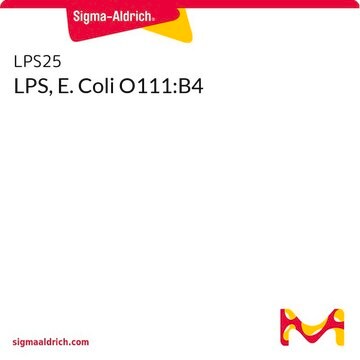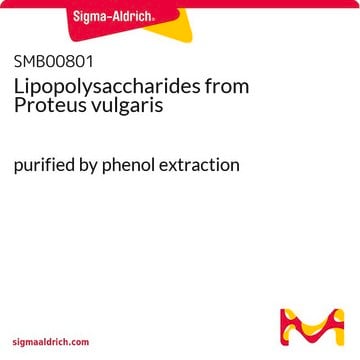L9143
Lipopolysaccharides from Pseudomonas aeruginosa 10
purified by phenol extraction
Sinónimos:
LPS
About This Item
Productos recomendados
origen biológico
Pseudomonas aeruginosa (10)
Nivel de calidad
Formulario
lyophilized powder
purificado por
phenol extraction
impurezas
<3% Protein (Lowry)
color
white to faint yellow
solubilidad
water: 4.90-5.10 mg/mL, faintly hazy to hazy, colorless to faintly yellow
Condiciones de envío
ambient
temp. de almacenamiento
2-8°C
¿Está buscando productos similares? Visita Guía de comparación de productos
Descripción general
Aplicación
Acciones bioquímicas o fisiológicas
Nota de preparación
Otras notas
Producto relacionado
Código de clase de almacenamiento
11 - Combustible Solids
Clase de riesgo para el agua (WGK)
WGK 3
Punto de inflamabilidad (°F)
Not applicable
Punto de inflamabilidad (°C)
Not applicable
Equipo de protección personal
Eyeshields, Gloves, type N95 (US)
Elija entre una de las versiones más recientes:
Certificados de análisis (COA)
¿No ve la versión correcta?
Si necesita una versión concreta, puede buscar un certificado específico por el número de lote.
¿Ya tiene este producto?
Encuentre la documentación para los productos que ha comprado recientemente en la Biblioteca de documentos.
Los clientes también vieron
Artículos
Explore the structure, function, and diverse applications of Lipopolysaccharides. Discover their role in bacteria, serological specificity, and research potential.
Nuestro equipo de científicos tiene experiencia en todas las áreas de investigación: Ciencias de la vida, Ciencia de los materiales, Síntesis química, Cromatografía, Analítica y muchas otras.
Póngase en contacto con el Servicio técnico




